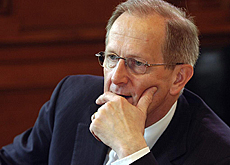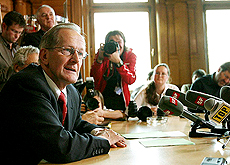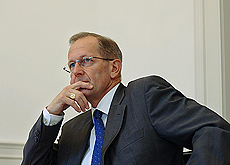Professor with a passion for politics

The outgoing economics minister, Joseph Deiss, had in many ways a textbook political career, moving from local to national politics.
Deiss, an economist by trade, was not a man of flamboyant gestures, which some took as a lack of assertiveness.
“Nice Deiss” was not only a catchy title for the 60-year-old politician. Dealing with the media, Deiss lived up to this good guy reputation, which he earned shortly after joining the cabinet as foreign minister in 1999.
His political opponents described him in less flattering terms; often as bookish, at times as a grey mouse. He himself didn’t think much of these clichés.
He saw it his primary task to win others over to his plans by persistence and through the power of persuasion, fully aware of having to work within a unique system based on compromise and respect for differing views.
Deiss said on Thursday he enjoyed having to fight to achieve his political goals. He also stressed how important it had been to him to maintain Switzerland’s multicultural traditions.
Local politics
Born into a Swiss-German family in the bilingual city of Fribourg in 1946, Deiss became perfectly fluent in French and considered himself a representative of this minority language community.
The professor of economics at Fribourg University went into politics relatively late in life – in 1981, aged 35 – when he became a member of Fribourg’s cantonal parliament. He was also mayor of his home village of Barberêche.
Ten years on he was elected to the national parliament as a member of the centre-right Christian Democratic Party, playing a leading role in a committee that prepared a complete overhaul of the federal constitution.
For three years he also held the post of Federal Price Regulator in charge of protecting consumers from unjustified high prices through lack of competition.
Track record
His election to the cabinet in 1999 was seen as a victory for liberal forces and a defeat for the business-oriented wing of his party.
His successes as a foreign minister (1999-2003) include Switzerland joining the United Nations in 2002 and the approval of two sets of bilateral accords with the European Union.
His critics thought less of his track record as economics minister (2003-2006). They point out the limited impact of his programmes to kick-start the stagnant economy, or the failure to negotiate a free trade agreement with the United States.
Deiss also came in for criticism during his term as Swiss president in 2003 amid a series of leaks over apparent tensions within the cabinet after the election of the outspoken Justice Minister Christoph Blocher from the rightwing Swiss People’s Party.
No pressure
Deiss dismissed any suggestion of caving in to pressure or undue job frustration when announcing his resignation on Thursday.
“It’s one of the few remaining privileges of a Swiss cabinet minister to choose the moment of resignation himself.” He added that one year longer would have been one too many.
Deiss said he was fond of his job and pleased to see the country’s economy picking up, while unemployment was continuing to drop.
Looking back over 25 years in politics he concluded that the country could not avoid change.
“Switzerland finds it hard to open up towards the outside world and to tackle reform on a domestic level.”
Asked about his plans for the future, he said he wished only for a less busy schedule.
“I’m looking forward to waking up in the morning, not knowing where I’ll be having lunch later in the day,” he smiled.
swissinfo, Urs Geiser
Joseph Deiss was born in Fribourg in 1946.
The professor of economics was a member of canton Fribourg’s cantonal parliament from 1981-1991. He also served as mayor of the Fribourg village, Barberêche, from 1982-1996.
Deiss was elected to Switzerland’s House of Representatives as a member of the centre-right Christian Democratic Party in 1991, and was the Swiss price regulator from 1993-1996.
He joined the cabinet in 1999 as foreign minister, and took over the economics portfolio in 2003.

In compliance with the JTI standards
More: SWI swissinfo.ch certified by the Journalism Trust Initiative



You can find an overview of ongoing debates with our journalists here. Please join us!
If you want to start a conversation about a topic raised in this article or want to report factual errors, email us at english@swissinfo.ch.